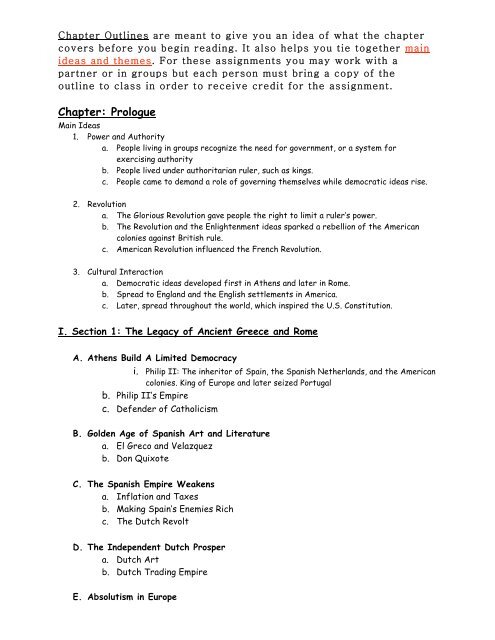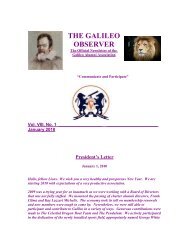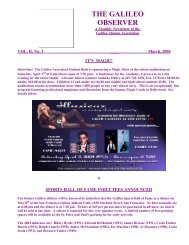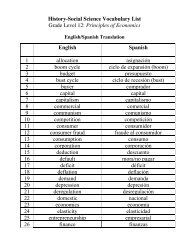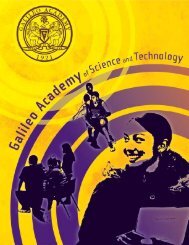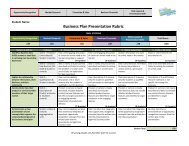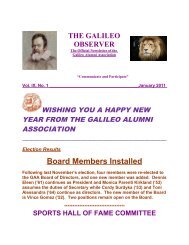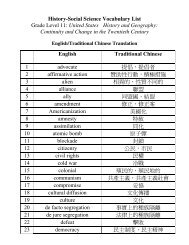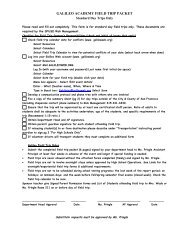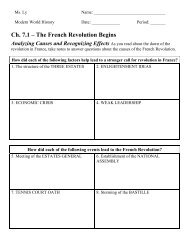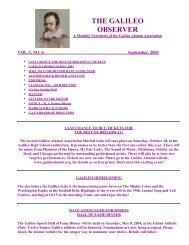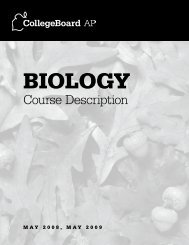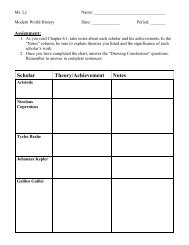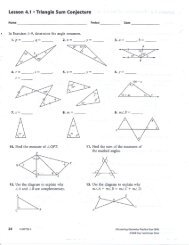Chapter Outline Sample
Chapter Outline Sample
Chapter Outline Sample
Create successful ePaper yourself
Turn your PDF publications into a flip-book with our unique Google optimized e-Paper software.
<strong>Chapter</strong>: Prologue<br />
Main Ideas<br />
1. Power and Authority<br />
a. People living in groups recognize the need for government, or a system for<br />
exercising authority<br />
b. People lived under authoritarian ruler, such as kings.<br />
c. People came to demand a role of governing themselves while democratic ideas rise.<br />
2. Revolution<br />
a. The Glorious Revolution gave people the right to limit a ruler’s power.<br />
b. The Revolution and the Enlightenment ideas sparked a rebellion of the American<br />
colonies against British rule.<br />
c. American Revolution influenced the French Revolution.<br />
3. Cultural Interaction<br />
a. Democratic ideas developed first in Athens and later in Rome.<br />
b. Spread to England and the English settlements in America.<br />
c. Later, spread throughout the world, which inspired the U.S. Constitution.<br />
I. Section 1: The Legacy of Ancient Greece and Rome<br />
A. Athens Build A Limited Democracy<br />
i. Philip II: The inheritor of Spain, the Spanish Netherlands, and the American<br />
colonies. King of Europe and later seized Portugal<br />
b. Philip II’s Empire<br />
c. Defender of Catholicism<br />
B. Golden Age of Spanish Art and Literature<br />
a. El Greco and Velazquez<br />
b. Don Quixote<br />
C. The Spanish Empire Weakens<br />
a. Inflation and Taxes<br />
b. Making Spain’s Enemies Rich<br />
c. The Dutch Revolt<br />
D. The Independent Dutch Prosper<br />
a. Dutch Art<br />
b. Dutch Trading Empire<br />
E. Absolutism in Europe
a. The Theory of Absolutism<br />
i. Absolute Monarchs: kings and queens who hold all the power within their<br />
states’ boundaries.<br />
ii. Divine Right: idea that God created the monarchy and that the monarch<br />
acted as God’s representative on Earth<br />
b. Growing Power of Europe Monarchs<br />
c. Crises Lead to Absolutism<br />
~Section 2: Judeo-Christian Tradition~<br />
Judaism<br />
-Created in God’s Image<br />
Judaism: based on the teachings on the God (Yahweh). Founded by Abraham, they studied the<br />
torah and live by the teachings.<br />
-Jewish Law Teaches Morality<br />
Ten Commandments:<br />
Christianity<br />
-The Teachings of Christianity<br />
Christianity: based on the life and teachings of Jesus Christ. They believe that Jesus entered<br />
the world and dies for humanity from sin. Christians believe that they’ll reach salvation by<br />
following the teachings of Jesus Christ.<br />
-The Spread of Christianity<br />
-Rome Spreads Judeo-Christian Ideas<br />
Islam<br />
Islam: based on the teachings of the prophet Muhammad. Followers are known as Muslims,<br />
believe that God revealed teachings to Muhammad by the angel Gabriel.<br />
-The Legacy of Monotheistic Religions<br />
-Louis Weakens the Nobles’ Authority<br />
Renaissance and Reformation<br />
Roman Catholic Church: developed by Roman Christianity. Became one of the most powerful<br />
institution in Europe. Influence all aspects of life- religion, social, and political.<br />
-Renaissance Revives Classical Ideas<br />
Renaissance: the biggest cultural movement from 1300s to 1600s. Marked the “rebirth” of art<br />
and culture.<br />
-The Reformation Challenges Church Power<br />
Reformation: a religious reform movement that began in the 16 th century. Those who wanted to<br />
reform the catholic church were called protestants, since they protested against the power and<br />
abuses of the church.<br />
-Legacy of the Renaissance and Reformation
~Section 3: Democracy Develops in England~<br />
Reforms in Medieval England<br />
-Juries and Common Law<br />
Common Law: the basis of the legal systems in many English-speaking countries.<br />
-Magna Carta<br />
Magna Carta: Main source of traditional English respect for the individual rights and liberties.<br />
Due Process of Law: the right to have the law work in known, orderly ways.<br />
Parliament: the body of lawmaking in English settlements.<br />
-Model Parliament<br />
Parliament Grows Stronger<br />
-Conflict With the Monarch<br />
Divine Right: is the theory that a monarch’s power came from God.<br />
-Parliament Overthrows the King<br />
Establishment of Constitutional Monarchy<br />
-The Restoration<br />
-Glorious Revolution<br />
Glorious Revolution: Parliament had the right to limit the monarch’s power and to control<br />
succession to the throne.<br />
Constitutional Monarchy: the powers of the rulers are restricted by the constitution and the<br />
laws of the country.<br />
-English Bill of Rights<br />
Bill of Rights: list of the rights and freedoms of the individual<br />
-England’s Legacy
~Section 4: The Enlightenment and Democratic Revolutions~<br />
Enlightenment Thinkers and Ideas<br />
Enlightenment: an intellectual movement that many enlightenment thinkers tried to apply the<br />
principles of reason and the methods of science to all aspects of society<br />
-Hobbes and Locke<br />
Social Contract: the agreement between citizens and the government.<br />
Natural Rights: an individual’s born rights.<br />
-Voltaire and Rousseau<br />
-Montesquieu<br />
Separation of Powers: government divided into three separate branches: legislative, executive,<br />
and courts to interpret them.<br />
The Beginnings of Democracy in America<br />
-Americans Protest British Policies<br />
-Americans Win Independence<br />
-Enlightenment Ideas Shape the Constitution<br />
Representative Government: all citizens elect representatives to make laws and policies for<br />
them.<br />
Federal System: government separated between the federal or central governments.<br />
The French Revolution<br />
-Causes of the Revolution<br />
-Early Reforms of the Revolution<br />
-Democratic Reforms Undone<br />
<br />
The Struggle for Democracy Continues<br />
-The United Nations Promotes Democracy<br />
United Nations:<br />
-New Movements Towards Democracy


